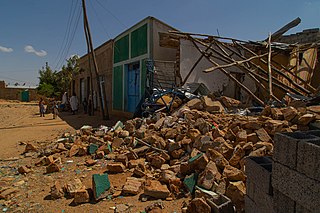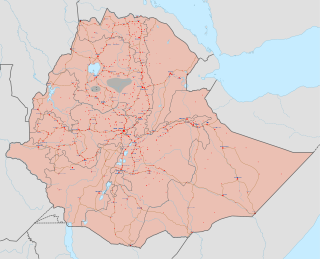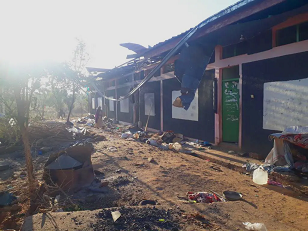Related Research Articles

Humera is a town in the Kafta Humera woreda in the Tigray Region of Ethiopia. Located in the Western Zone the town has an elevation of 585 metres (1,919 ft) above sea level. The Tekezé river borders the town to the north. Humera is a very important regional agricultural center based on intensive agriculture. It is the last Ethiopian town south of the border with Eritrea and Sudan, and is considered to be a strategically important gateway to Sudan.

Abiy Ahmed Ali is an Ethiopian politician serving as the third Prime Minister of Ethiopia since 2018, and as the leader of the Prosperity Party since 2019. He was awarded the 2019 Nobel Peace Prize "for his efforts to achieve peace and international cooperation, and in particular for his decisive initiative to resolve the border conflict with neighbouring Eritrea". Abiy served as the third chairman of the Ethiopian People's Revolutionary Democratic Front (EPRDF) that governed Ethiopia for 28 years and the first person of Oromo descent to hold that position. Abiy is a member of the Ethiopian parliament, and was a member of the Oromo Democratic Party (ODP), one of the then four coalition parties of the EPRDF, until its rule ceased in 2019 and he formed his own party, the Prosperity Party.

The Tigray War was an armed conflict that lasted from 3 November 2020 to 3 November 2022. The war was primarily fought in the Tigray Region of Ethiopia between forces allied to the Ethiopian federal government and Eritrea on one side, and the Tigray People's Liberation Front (TPLF) on the other.
The Transitional Government of Tigray was a caretaker administration that was formally declared by the House of Federation of Ethiopia on 7 November 2020, in the context of a conflict between the Tigray People's Liberation Front (TPLF), in power in the Tigray Regional State and the federal government of Ethiopia. In late November 2020, the administration, headed by Mulu Nega, planned public consultation and participation in choosing new leaders at the regional and zonal level and preservation of woreda and kebele administrations. The Transitional Government left Tigray in late June 2021 during Operation Alula.

The Mai Kadra massacre was a massacre and ethnic cleansing carried out during the Tigray War on 9–10 November 2020 in the town of Mai Kadra in Welkait in northwestern Ethiopia, near the Sudanese border. Responsibility was attributed to a pro-TPLF youth group and forces loyal to the Tigray People's Liberation Front (TPLF) in the EHRC-OHCHR Tigray Investigation, preliminary investigations by Amnesty International, the Ethiopian Human Rights Commission (EHRC) and the Ethiopian Human Rights Council (EHRCO), and interviews conducted in Mai Kadra by Agence France-Presse. The Office of the United Nations High Commissioner for Human Rights (OHCHR) and EHRC reported that at least 5 Tigrayans were killed in Mai Kadra by Amhara militas such as Fano in retaliation. Tigrayan refugees in Sudan told multiple news outlets that Tigrayans in Mai Kadra were targeted by either Amhara militias, the Ethiopian National Defense Force (ENDF), or both.
The Ethiopian Human Rights Commission (EHRC) is a national human rights institution (NHRI) established by the Ethiopian government. The EHRC is charged with promoting human rights and investigating human rights abuses in Ethiopia. The EHRC states organizational independence as one of its values. In October 2021, the EHRC's rating by the Global Alliance of National Human Rights Institutions for operation in accordance with the UN Paris Principles was upgraded from grade B to grade A.
Mai Kadra is a town in Tigray Region, Ethiopia near the Sudanese border. Mai Kadra was the site of the deadliest massacre during the Tigray War.
This timeline of the Tigray War is part of a chronology of the military engagements of the Tigray War, a civil war that began in the Tigray Region of Ethiopia in early November 2020.

Fano is an ethno-nationalist Amhara militia and former protest movement. It has engaged in violent clashes throughout Ethiopia in the name of neutralizing perceived threats to the Amhara people. Fano has absorbed many units and personnel of the Amhara Regional Special Forces that did not integrate into the Ethiopian National Defense Force (ENDF). Fano militias have been involved in armed conflicts with the Tigray People's Liberation Front (TPLF), the Oromo Liberation Army (OLA), and the ENDF. They have also clashed with the Sudanese Armed Forces (SAF) on the border of Ethiopia and Sudan.

Casualties of the Tigray War refers to the civilian and military deaths and injuries in the Tigray War that started in November 2020, in which rape and other sexual violence are also widespread. Precise casualty figures are uncertain. According to researchers at Ghent University in Belgium, as many as 600,000 people had died as a result of war-related violence and famine by late 2022. The scale of the death and destruction led The New York Times to describe it in November 2022 as "one of the world’s bloodiest contemporary conflicts."

All sides of the Tigray War have been repeatedly accused of committing war crimes since it began in November 2020. In particular, the Ethiopian federal government, the State of Eritrea, the Tigray People's Liberation Front (TPLF) and Amhara regional forces have been the subject of numerous reports of both war crimes and crimes against humanity.
The Battle of Humera was fought between Ethiopia and allied forces against forces loyal to the Tigray People's Liberation Front (TPLF) in the city of Humera during the Tigray War. The battle took place from 9 to 11 November 2020, and is the first recorded time Eritrean troops saw action. It also led to the Humera massacre when Amhara and Ethiopian troops started beating and killing civilians. Many more civilians were killed and wounded because of the shelling during the battle. After it was controlled by the Eritrean, Ethiopian and Amhara started house in house search detained everyone they found, loot every house and put the people in concentration camps. Day by day the Amhara forces killed the residents they put in the concentration camps, and dumped the bodies over the bridge into Tekeze River.

The Tigrayan peace process encompasses the series of proposals, meetings, agreements and actions that aimed to resolve the Tigray War.

Following the 2018 dissolution of the ethnic federalist, dominant party political coalition, the Ethiopian People's Revolutionary Democratic Front, there was an increase in tensions within the country, with newly resurgent regional and ethnically based factions carrying out armed attacks on military and civilians in multiple conflicts throughout Ethiopia.

The EHRC–OHCHR Tigray investigation is a human rights investigation launched jointly by the Ethiopian Human Rights Commission (EHRC) and the Office of the United Nations High Commissioner for Human Rights (OHCHR) in mid-2021 into human rights violations of the Tigray War that started in November 2020. The EHRC–OHCHR joint investigation team's report was published on 3 November 2021.
The Humera massacre was an ethnic mass murder event carried out in November 2020 in the town of Humera in the Tigray Region of northwestern Ethiopia, next to the Sudanese border. The massacre took place during an armed conflict between the regional government of Tigray and the federal government of Ethiopia. Refugees attributed the massacre to Amhara militias, including Fano, and the Ethiopian National Defense Force (ENDF).
This Timeline of the Tigray War is part of a chronology of the military engagements of the Tigray War, a civil war that began in the Tigray Region of Ethiopia in early November 2020.

In the late hours of 7 January 2022, the Ethiopian Air Force (ETAF) carried out an airstrike on a camp for internally displaced persons (IDP) set up in Dedebit Elementary School, located in the Tigray Region of Ethiopia. Between 56 and 59 people were killed in the attack, and at least 30 others were left injured.

Since the 1990s, the Amhara people of Ethiopia have been subject to ethnic violence, including massacres by Tigrayan, Oromo and Gumuz ethnic groups among others, which some have characterized as a genocide. Large-scale killings and grave human rights violations followed the implementation of the ethnic-federalist system in the country. In most of the cases, the mass murders were silent with perpetrators from various ethno-militant groups—from TPLF/TDF, OLF–OLA, and Gumuz armed groups.

Since the start of Tigray War in November 2020, the Eritrean government has been heavily involved in the war against the Tigray People's Liberation Front (TPLF) in support of the Ethiopian government.
References
- 1 2 3 "Human Rights Situation in Tigray Region requires an immediate solution" (PDF). Ethiopian Human Rights Council . 2021-01-22. Archived (PDF) from the original on 2021-01-23. Retrieved 2021-01-26.
- 1 2 3 4 "State of Emergency Inquiry Board Begins Work". Ethiopian News Agency. 2020-11-17. Archived from the original on 2021-01-23. Retrieved 2021-01-26.
- ↑ "Ethiopia - Constitution". University of Bern . 1995. Archived from the original on 2012-05-26. Retrieved 2021-01-26.
- ↑ Mohammed, Abdurezak (2020-11-20). "Ethiopia: A Glimpse of State of Emergency in Tigray". Ethiopian Herald . Archived from the original on 2021-01-23. Retrieved 2021-01-26.
- ↑ "State of Emergency Inquiry Board Unveils Field Report". Ethiopian News Agency. 2020-12-10. Archived from the original on 2021-01-23. Retrieved 2021-01-26.
- ↑ Abiye, Yonas (2020-12-12). "Board accuses Sudanese forces of conspiring with TPLF to kill civilians". The Reporter . Archived from the original on 2021-01-23. Retrieved 2021-01-26.